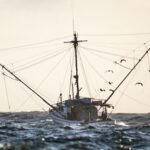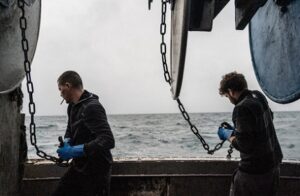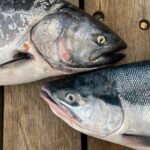Tag Archives: Pacific sardines
“A Total Shock” – Japanese Sardines Detected in U.S. Waters
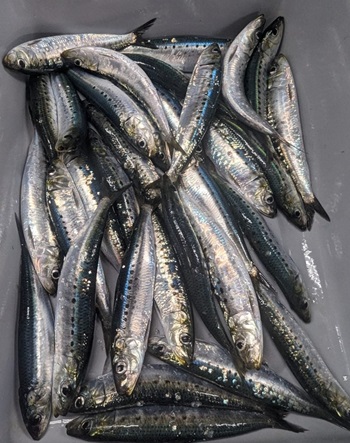 Genomic sequencing of Pacific sardines in 2022 and 2023 uncovered the presence of not just one, but two distinct sardine species in the California Current. When research scientist Gary Longo first reviewed the results of his genomic analysis of sardines, he thought he must have mixed up his samples. Besides the Pacific sardines common on the West Coast, many of the fish appeared to be another species. “It was a total shock,” he said. Then he compared their genetic code to other known species. “That was the ‘aha moment’ when we realized we were looking at a second species of sardine.” The analysis shows that of the 345 sardine samples collected during NOAA Fisheries’ 2021 and 2022 Coastal Pelagic Species Surveys, all of the fish in 2021 were Pacific sardines, but those collected in 2022 were a mix of Pacific sardines and Japanese sardines. more, >>CLICK TO READ<< 10:50
Genomic sequencing of Pacific sardines in 2022 and 2023 uncovered the presence of not just one, but two distinct sardine species in the California Current. When research scientist Gary Longo first reviewed the results of his genomic analysis of sardines, he thought he must have mixed up his samples. Besides the Pacific sardines common on the West Coast, many of the fish appeared to be another species. “It was a total shock,” he said. Then he compared their genetic code to other known species. “That was the ‘aha moment’ when we realized we were looking at a second species of sardine.” The analysis shows that of the 345 sardine samples collected during NOAA Fisheries’ 2021 and 2022 Coastal Pelagic Species Surveys, all of the fish in 2021 were Pacific sardines, but those collected in 2022 were a mix of Pacific sardines and Japanese sardines. more, >>CLICK TO READ<< 10:50
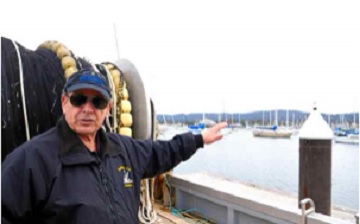
Fishermen know the truth about sardines
Reporter Anne Roth quoted me in her article “When will sardines return? Not any time soon say scientists.” But she misunderstood what I said. I’m one of the fishermen Diane Pleschner-Steele quoted in her comment, “Fishermen are seeing more sardines, not less.” I’ve been fishing for 60 years, and I’ve seen sardines come, go and come back again. But the government surveys that assess the biomass don’t come into coastal waters where the fish are now. In fact, we began seeing an abundance of small sardines right before the 2015 El Niño. Aniello Guglielmo, Monterey >click to read< for more articles on this issue, >click to read<12:19
D.B. PLESCHNER: Recent Fishery Study Debunked by 1,400 Years of Data
 In an article in International Business Times (August 5, 2015), Aditya Tejas quoted researcher Malin Pinsky in his recently published paper that claims smaller, faster-growing fish like sardines and anchovies are more vulnerable to population collapses than larger fish. While it’s common these days to blame the ocean’s woes on overfishing, the truth is Pinsky’s conclusions don’t paint a complete picture. Fortunately, we do have an accurate picture and it’s definitely better than the proverbial thousand words. Read the rest here 20:56:09
In an article in International Business Times (August 5, 2015), Aditya Tejas quoted researcher Malin Pinsky in his recently published paper that claims smaller, faster-growing fish like sardines and anchovies are more vulnerable to population collapses than larger fish. While it’s common these days to blame the ocean’s woes on overfishing, the truth is Pinsky’s conclusions don’t paint a complete picture. Fortunately, we do have an accurate picture and it’s definitely better than the proverbial thousand words. Read the rest here 20:56:09
Another View: Sardine population isn’t crashing by D.B. Pleschner
 Environmental groups such as Oceana complain that the sardine population is collapsing just as it did in the mid-1940s. They blame “overfishing” as the reason and maintain that the fishery should be shut down completely (“Starving sea lions spotlight overfishing,” Viewpoints, April 14). In truth, Pacific sardines are perhaps the best-managed fishery in the world. The current rule – established in 2000 and updated last year with more accurate science – sets a strict harvest guideline. Read the rest here 10:25
Environmental groups such as Oceana complain that the sardine population is collapsing just as it did in the mid-1940s. They blame “overfishing” as the reason and maintain that the fishery should be shut down completely (“Starving sea lions spotlight overfishing,” Viewpoints, April 14). In truth, Pacific sardines are perhaps the best-managed fishery in the world. The current rule – established in 2000 and updated last year with more accurate science – sets a strict harvest guideline. Read the rest here 10:25
West Coast: Caught in the Sardine Shortage Net
 A debate is on about whether the drop is cyclical or a sign of more dire shortages to come. But whatever the reason, commercial fishers, retailers, and even eco-tourist outfits could feel a ripple effect. [email protected] 13:06
A debate is on about whether the drop is cyclical or a sign of more dire shortages to come. But whatever the reason, commercial fishers, retailers, and even eco-tourist outfits could feel a ripple effect. [email protected] 13:06

































